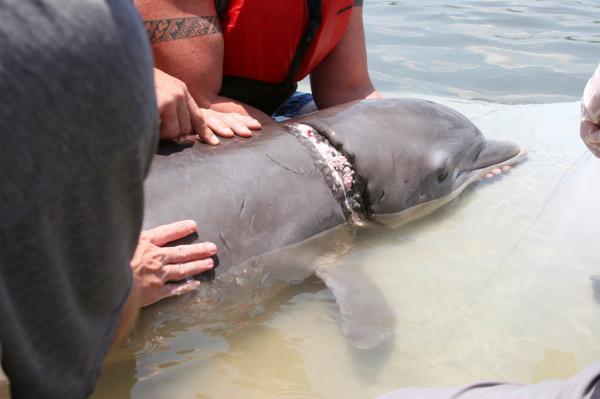
Marine creatures are among the most impacted by plastic pollution. A huge amount of plastic waste – much of which was originally placed into recycle bins by well-meaning folks – ends up in rivers and oceans.
An estimated 3.5 million pieces of plastic enter our oceans every single day. That is 8 to 13 million tons of plastic each year, killing an untold number of marine mammals, fish and birds.
This baby dolphin was saved. Most are not. It’s estimated that for every sea creature found that was killed by plastic, another 50 are never found.

Photo by Plastic Ocean Project
Researchers have found that sea turtles and other marine creature mistake the smell of plastic bags for food. Ingesting plastic is most often fatal for these beautiful creatures who are unable to digest or excrete it.
It’s becoming very clear that the use of plastics is having a devastating impact on animals in every ocean and on every continent in the world. There are many alternatives to single use plastic.
For more information and some simple first steps in reducing your use of plastic, see:
The Truth About Recycling
You’re Not Gonna… Throw That Away, Are You?! and
You’re Not Gonna …Buy That, Are You?!
Manatees in Peril
Did you know the manatees need fresh water? This one slurped fresh water from a seaside park providing an opportunity to study her remarkable snout. Click here for the video and to learn more about her exquisitely sensitive whiskers.
Once considered magical, and often mistaken for mermaids by ancient mariners, manatees are now starving to death in record numbers. Despite a desperate attempt to feed these “gentle giants” in the wild, over 1,500 manatees – about 20% of Florida’s manatee population- have died in just the past 15 months as their food base disappears from Florida’s intensely polluted waters.
Most of the 2021 necropsies revealed sunken heads, visible ribs and organs atrophied from starvation. According to Public Employees for Environmental ResponsibilityFlorida has sharply reduced the rate of manatee necropsies. Meanwhile, sewage and fertilizer continue pouring unabated into its waters, spurring lethal toxic algal blooms and suffocating the seagrasses these vegetarian mammals feed on.
Ironically, three days after National Manatee Appreciation Dayon March 30, a federal judge paused the lawsuit brought byenvironmental groupsagainst Florida’s Department of Environmental Protection for authorizing the release into Tampa bay of 215 millions of gallons of wastewater contaminated with radioactive gypsum–one of the pollutants wiping out seagrasses and thus manatees.
